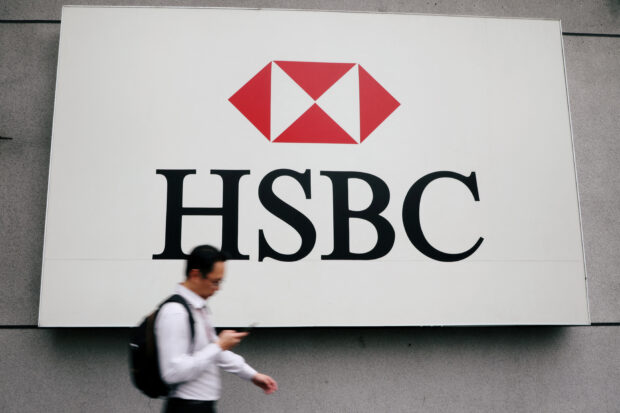
A man walks past a logo of HSBC at its headquarters in Kuala Lumpur, Malaysia Aug 6, 2019. REUTERS/Lim Huey Teng/File photo
HONG KONG/LONDON -HSBC on Monday reported a fresh $3-billion share buyback and a more than doubling of third-quarter profit that nonetheless missed forecasts as spending on technology and operations grew and inflation pushed wage expectations higher.
The results from Europe’s biggest bank showed the pressure it is under to deliver returns to long-suffering investors now that interest rates worldwide are rising.
HSBC indicated costs are likely to increase by up to 5 percent this year excluding an acquisition, more than its previous goal of a 3- percent rise, as technology and operating spending grows and it considers a boost to staff bonuses in the fourth quarter.
The bank posted a pre-tax profit of $7.7 billion for the July to September quarter, versus $3.2 billion a year earlier, but the result trailed the $8.1 billion mean average estimate of brokers compiled by HSBC.
HSBC’s profit was below expectations and “costs are likely to be the area of controversy”, said London-based Jefferies analyst Joe Dickerson, though he added the share buyback was $1 billion larger than his forecast.
The London-headquartered bank with a market value of $118.6 billion said it aimed to complete the share buyback by next February, lifting the total buybacks announced this year to $7 billion.
It also dished out the third interim dividend payout this year of 10 cents per share, bringing the total payout this year to 30 cents per share.
The bank’s Hong Kong-listed shares were down 0.26 percent after the earnings release, narrowing losses from 2.1 percent in the morning and outperforming the market’s wider financial index, which fell 1.21 percent .
HSBC’s third-quarter revenues rose 2 percent in the Global Banking and Markets division that houses its investment bank, a more robust performance than rival Barclays’ 6 percent drop as HSBC’s large payments business benefited from higher interest rates.
New flows into its wealth business gained traction, with $34 billion of net new invested assets in the quarter and its wealth balance sheet growing by 12 percent compared with last year.
The lender’s net interest margin of 1.7 percent was squeezed by 2 basis points compared with the prior quarter, reflecting an increase in customers migrating their deposits to term products, particularly in Asia.
In the third-quarter results, the lender booked a $500 million impairment related to the commercial real estate sector in mainland China.
“We continue to monitor risks related to our exposures in mainland China’s commercial real estate sector closely, and there remains a degree of uncertainty in the forward economic outlook, particularly in the UK,” the company said in the results statement.
HSBC’s Asia-focused competitor Standard Chartered reported last week an unexpected one-third plunge in third-quarter profit due to a nearly $1 billion combined hit from its exposure to China’s real estate and banking sectors.

